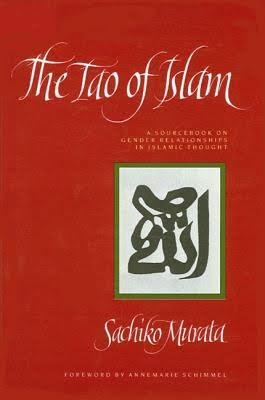 Hieronder geef ik allereerst het belang van dit boek aan (1). Daarna volgt een (zeer korte) samenvatting van dit boek (2) en aan het einde een aantal uitvoerige boekbesprekingen (onder 12). Daartussen heb ik een artikel opgenomen, van dezelfde schrijver, met dezelfde titel als het boek, bij wijze van een eigen beknopte samenvatting van zijn boek (onder 3-11). Dat artikel vindt u hier als pdf.
Hieronder geef ik allereerst het belang van dit boek aan (1). Daarna volgt een (zeer korte) samenvatting van dit boek (2) en aan het einde een aantal uitvoerige boekbesprekingen (onder 12). Daartussen heb ik een artikel opgenomen, van dezelfde schrijver, met dezelfde titel als het boek, bij wijze van een eigen beknopte samenvatting van zijn boek (onder 3-11). Dat artikel vindt u hier als pdf.
In de islamitische visie op de dingen ontstaat alles in de combinatie van de complementaire goddelijke namen, de namen van Schoonheid en Verhevenheid, of de namen van yin en van yang. Dualiteit op het goddelijke niveau leidt tot een dualiteit in de mens, geestelijk en lichamelijk, of vormloos en met vorm. De vorm of het lichaam is het ontvangende medium van het vormloze of geestelijke, en samen zijn zij de plek waar de goddelijke natuur zich manifesteert. Met andere woorden, de oorspronkelijke aard van de mens is een kopie van de goddelijke natuur. Geestelijke perfectie bestaat uit het realiseren van die oer- of oorspronkelijke aard. De goddelijke natuur is latent aanwezig in een ieder van ons.
“Eén yin en één yang. Dat is Tao. Meekrijgen van de Tao is goed. De Tao realiseren is de kern van de menselijke aard”
- Het belang van dit perspectief, en dit boek
- Een zeer korte samenvatting (van de uitgever) en een paar recensies in trefwoorden
- Looking at islam from the point of view of Chinese thought
- The Cosmos in Islamic terms
- Two basic theological perspectives – transcendence and immanence
- The continual recreation of the Cosmos
- The Pen and the Tablet – Duality understood
- Heaven and Earth – Duality continued
- Confucius sounds just like another Muslim cosmologist
- Concluding remarks
- References
- Boekbesprekingen van The Tao of Islam
Het belang van dit perspectief, en dit boek
In dit boek legt de schrijver allerlei verbanden tussen het islamitisch wereld- en godsbeeld, en het Chinese denken. Dat is om meerdere redenen van belang. De ondertitel van het boek luidt: “A Sourcebook on Gender Relationships in Islamic Thought”.
Ten eerste
Ten tweede
Een zeer korte samenvatting (van de uitgever) en een paar recensies in trefwoorden
The Tao of Islam is a rich and diverse anthology of Islamic teachings on the nature of the relationships between God and the world, the world and the human being, and the human being and God. Focusing on gender symbolism, Sachiko Murata shows that Muslim authors frequently analyze the divine reality and its connections with the cosmic and human domains with a view toward a complementarity or polarity of principles that is analogous to the Chinese idea of yin/yang.
Murata believes that the unity of Islamic thought is found, not so much in the ideas discussed, as in the types of relationships that are set up among realities. She pays particular attention to the views of various figures commonly known as “Sufis” and “philosophers,” since they approach these topics with a flexibility and subtlety not found in other schools of thought. She translates several hundred pages, most for the first time, from more than thirty important Muslims including the Ikhwan al-Safa’, Avicenna, and Ibn al-‘Arabi.
Sachiko Murata is Professor of Religious Studies at the State University of New York, Stony Brook.
This is a genuine foundational work in Islamic studies. It is an open door into the very heart of Islamic civilization, while at the same time it suggests the bases of important comparisons and insights for those interested in cognate areas in Western cultures.
It is a fascinating, truly original work in both its guiding perspectives and its comprehensive, clearly presented account of a central dimension of Islam. There is nothing like it, and it deserves a wide audience. — James W. Morris, Oberlin CollegeIt clearly, competently, and comprehensively describes the worldview implicit in the medieval Islamic “wisdom” tradition represented by Sufism and Shi’i philosophy, particularly the way that gender concepts are implicit in their cosmology and psychology, and can be related to the Taoist concepts of yin and yang. The author’s critique of feminism and modern reformism on this basis is penetrating. — Valerie Hoffman-Ladd, University of Illinois
Looking at islam from the point of view of Chinese thought
Tekst onder 3e kop
The Cosmos in Islamic terms
Tekst onder 4e kop
Two basic theological perspectives – transcendence and immanence
Tekst onder 5e kop
The continual recreation of the Cosmos
Tekst onder 6e kop
The Pen and the Tablet – Duality understood
Tekst onder 7e kop
Heaven and Earth – Duality continued
Tekst onder 8e kop
Confucius sounds just like another Muslim cosmologist
Tekst onder 9e kop
Concluding remarks
Tekst onder 10e kop
References
Tekst onder 11e kop
Boekbesprekingen van The Tao of Islam
Ik heb de volgende boekbesprekingen op afzonderlijke sub-pagina’s opgenomen:
- Pierre Lory, in: Studia Islamica, No. 78 (1993), pp. 194-196
- Marietta Stepaniants, in: Philosophy East and West, Vol. 44, No. 3 (Jul., 1994), pp. 582-586
- Carl W. Ernst, in: Journal of the American Oriental Society, Vol. 114, No. 4 (Oct. – Dec., 1994), pp. 677-678
- Dr. Muhammad Legenhausen, op de website Al-Islam.org